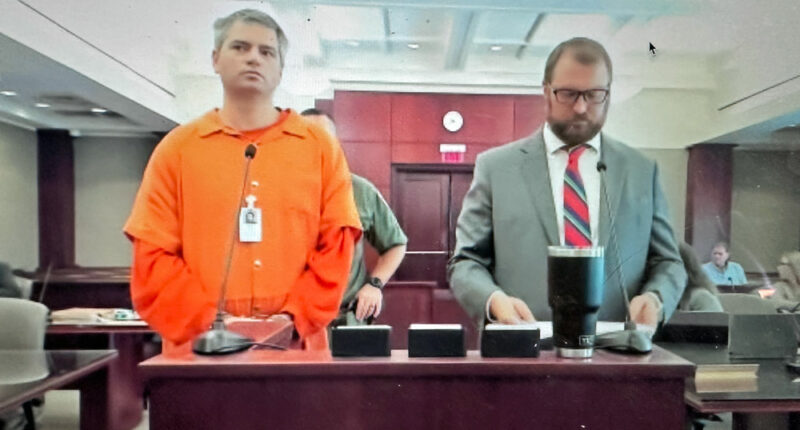
All he had to do was respect the injunction.
Circuit Judge Dawn Nichols’s patience had been tested. Repeatedly. Today, she was out of it, and Zachary Tuohey, a 35-year-old father of three, a once well-off, Tesla-driving Realtor who until nine months ago had never had a run-in with the law, let alone seen the inside of a jail cell, was out of luck.
Nichols sentenced him to three years in prison followed by 18 months on probation with severe conditions. It had all started with an injunction his ex-girlfriend had filed, and which he kept violating. Then he repeatedly violated his probation.
The sentence shocked Tuohey’s mother, whose outburst in the courtroom led Nichols to invite her to leave. But his mother had been in the courtroom just last December and heard Nichols’s warning to her, to her ex-husband and to Tuohey: “Stop playing games and stop coming right up to the edge of it, because now you’re on notice here in the courtroom,” the judge told them all. “You are on notice.”
Tuohey didn’t take her seriously when he was on probation. He did not take the state’s offer of two years in prison to settle the latest violations. He tendered an open plea, leaving it to Nichols to decide the sentence. The state asked for four years in prison. The defense asked for more probation. Nichols made clear she had no intention to go easy on him anymore.
“He had every opportunity while he was on community supervision to get help,” Nichols said moments before she sentenced him. “He just did not take those opportunities. And I’m very sorry that he didn’t do that. I’m sorry for his family.”
Tuohey, an Orlando resident, last year had been dating a woman in Palm Coast. She broke up with him. He stalked her. She filed an injunction last July, which Circuit Judge Chris France granted. Tuohey repeatedly violated the injunction and sent weird, argumentative emails to the court and to law enforcement.
Last October he was arrested for aggravated stalking, a third-degree felony.
The prosecution wanted to revoke bond. Nichols at last December’s hearing was ready to do it, but gave in to Tuohey’s attorney at the time, Travis Mydock, who argued with a strange, convoluted story Tuohey’s parents corroborated, that the latest violations were not his doing. Nichols relented, but also made her “you’re on notice” speech, also noting that “somebody is being cute, and I don’t appreciate it.”
In March, Tuohey violated his probation again by evading his GPS monitor and driving out of county, to Tampa, ostensibly to meet a client when he was working for his father. That made 10 total violations. He was again arrested, this time without bond.
He’s been at the Flagler County jail since April 1. The court agreed to have him evaluated by Dr Jennifer Rohrer, a psychologist.
The report echoed Nichols’s own diagnosis from the bench earlier this year. It “makes complete sense. The Good, the Bad and the Ugly,” the judge said today. “It makes sense that he suffers from the Cluster B traits and personality disorder.” According to the Mayo Clinic, Cluster B personality disorders “have a consistently dysfunctional pattern of dramatic, overly emotional thinking or unpredictable behavior, from fears of abandonment to anger to impulsive, risky behavior.
Tuohey’s current attorney, Assistant Public Defender Spencer O’Neal, used the report to buttress his argument that Tuohey needed mental health treatment, not prison. Tuohey’s family had lined up outpatient services for him.
An admissions counselor at Lifeskills, the mental health facility in Orlando where Tuohey had been treated before, described the five-days-a-week care he would receive there as an outpatient, since the family could not afford the $38,000-a-month inpatient care. But the counselor had not reviewed the Rohrer report. She had not spoken to Tuohey, only his family members, and she was not aware of his criminal background or the charges he faced.
Testifying to the court, Tuohey’s mother said he would “live with his family” if he were released. His family intended to reduce the “stressors” that caused him to behave inappropriately. “As a family, we have decided that we will help reduce those stressors and also help him create a calendar of where he will be every day and what the expectation is,” she said, to ensure that he does not violate his probation as he has in the past, by traveling out of county.
But when Assistant State Attorney Tara Libby asked the mother to specify where Tuohey would be living specifically, she conceded that he’d be living in his own house with his children. “Somebody will be with him 24/7,” she said. “He has a pretty large family, between myself, his dad, his stepdad and his siblings, we will create a schedule so we can ensure that he is with someone
That didn’t help his case. Nor, it appeared, did Tuohey help himself, when he addressed the court.
“When I was initially charged and arrested, I didn’t know how bad the charges were. I do now,” he said, saying his medication was helping. “I feel like my mind is getting sharper. Obviously not where I need to be or want to be, but that’s where I’m at right now.”
“Did you understand how quickly things were going to fall apart?” O’Neal, asked him.
“No, not initially. I’m now starting to understand it,” Tuohey said. He stood next to O’Neal at the lectern, facing the judge in his orange jail garb, his jet-black hair from last December, when he was still on probation, replaced by gray.
The victim testified on zoom. She told the court she was still “fearful” of him. “It didn’t seem like he was respecting the court or what was ordered.” At the least, she wanted him to be subject to a GPS monitor (again) if he was released on probation.
O’Neal asked the court to “give him another opportunity” to make probation successful. He said when he first spoke with Tuohey after becoming his attorney (after receiving a “strange” letter from him), “the most striking thing about our meeting was when he looked at me and told me that he didn’t really comprehend how serious it was going to get,” O’Neal told the court. “I just don’t know that he understood how quickly things were going to go sideways, and he was looking at a serious prison sentence.”
Nichols didn’t buy it. Not with Tuohey’s history, and the psychologist’s report’s mention of his “tendency to rebel” and for “malingering,” or feigning ailments to evade responsibility.
The judge did not pretend that he would get adequate treatment in prison. “I don’t think he’s going to get the level of treatment that he needs for the personality disorders in custody,” she said. Nor would he likely get it in civilian life. “As the family found out, it’s very hard to get that kind of specialized treatment for what he suffers from.”
After pronouncing the sentence, she addressed the family, urging them to read up on the particular kind of personality disorder Tuohey is subject to. “This is something that is sometimes hereditary, but the dramatic, histrionic over the top behaviors that he exhibits, when you start to read up on it, you’re going to be like: Oh my God, that’s your brother, that’s your son,” the judge said.
Nichols continued: “I’m not saying he’s a terrible person. He has just not gotten it, and it is going to take, very sadly, incarceration, for it to stick, to sink in for him. And hopefully he never wants to go back there again. And you may respectfully disagree. I understand that. But the reality is this court also has to take into consideration that he’s a violent felony offender of special concern, and the court has to take into consideration the safety of the community and the safety of the victim.”










